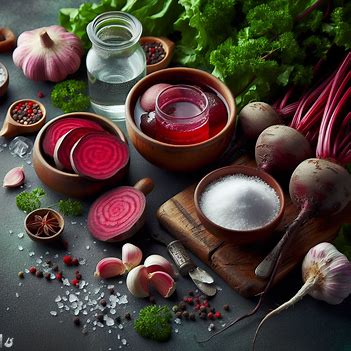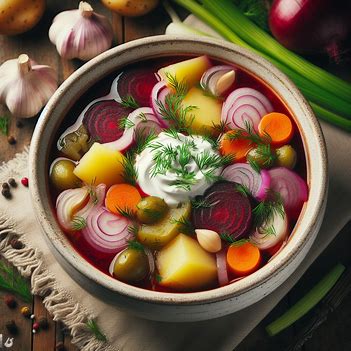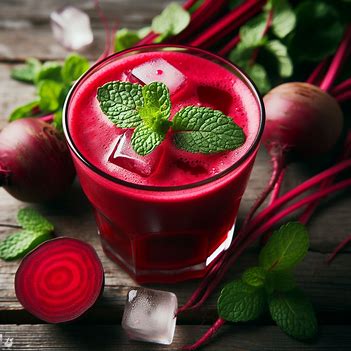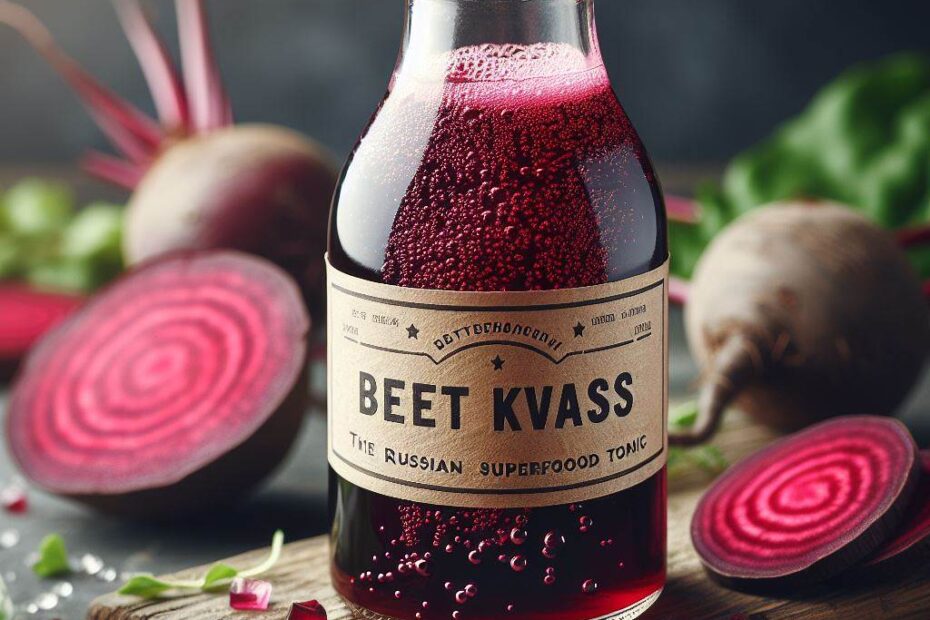Beet kvass, a traditional fermented beverage, has been gaining popularity for its impressive health benefits and unique flavor. In this comprehensive guide, we will delve into the world of beet kvass, exploring its origins, the simple yet fascinating process of making it, and the key ingredients required.
We will examine the numerous benefits of incorporating beet kvass into your diet, from boosting the immune system to detoxifying the body. It’s crucial to understand the potential side effects that may arise from consuming beet kvass. We will provide valuable insights on how to seamlessly integrate beet kvass into your daily routine and offer tantalizing recipes that showcase its versatility.
Whether you’re a health enthusiast or simply curious about exploring new culinary experiences, this article will equip you with all the essential knowledge about beet kvass and inspire you to reap its rewards.
Key Takeaways:
- Beet kvass is a fermented drink made from beets, salt, and water.
- Drinking beet kvass can provide various health benefits, such as boosting the immune system, improving digestion, and detoxifying the body.
- It is important to be aware of potential side effects and to incorporate beet kvass into your diet in moderation.
What is Beet Kvass?
Beet Kvass is a traditional fermented drink, originating from Eastern European cultures, known for its tangy and slightly sweet flavor profile.
It has a long history, dating back to ancient times, and has been a staple in traditional diets, especially in Russian and Ukrainian cuisine. The fermentation process involves submerging beets in water with a touch of sea salt, allowing natural lacto-fermentation to take place. This process not only enhances the flavor but also creates a rich concentration of probiotics, vitamins, and enzymes, all of which are beneficial for digestive health.
The renowned recipe from the book ‘Nourishing Traditions’ has popularized this gut-friendly drink among health enthusiasts.
How Is Beet Kvass Made?
Beet Kvass is made through the process of lacto-fermentation, where beets are combined with water, salt, and lactobacilli to create a probiotic-rich elixir. The recipe typically involves organic ingredients, such as pickle brine and Himalayan salt, to enhance the fermentation process.
To start, the beets are washed thoroughly and then chopped or grated before being placed into a clean glass jar along with the Himalayan salt, pickle brine, and water. The addition of these organic elements not only infuses the kvass with rich flavors but also promotes the growth of beneficial bacteria during the fermentation. The lacto-fermentation process, facilitated by the lactobacilli, creates an environment where these bacteria thrive and produce lactic acid, which preserves the beets and imparts their characteristic tangy flavor.
What Are the Ingredients Needed for Beet Kvass?

The ingredients required for preparing Beet Kvass include beets, salt, water, and additional flavorings such as dill, bay leaves, onion, garlic, ginger, and turmeric root to infuse a range of complementary flavors.
Beets are the essential main ingredient in Beet Kvass, providing a distinct earthy sweetness and vibrant color. These are often cut into small cubes or slices, allowing their flavors to infuse effectively into the liquid. Salt is a crucial component, aiding in the fermentation process and preserving the kvass while adding a balanced salty taste.
Water serves as the liquid base for the kvass, enabling the fermentation of the beets and other flavorings. Additional flavorings like dill, bay leaves, onion, garlic, ginger, and turmeric root contribute to the complexity of flavors, offering aromatic and spicy notes to the final kvass.
Beets
Beets form the foundational element of Beet Kvass, providing the rich, earthy essence and nutritional benefits essential to the fermentation process. These vibrant root vegetables also contain betalains, which contribute to the unique color and potential health advantages of the kvass.
During the fermentation process, beets release their natural sugars, promoting the growth of beneficial bacteria essential for creating the tangy, probiotic-rich flavor of Beet Kvass. Their high levels of folate and manganese further enhance the nutritive value of this traditional beverage, making it an excellent source of essential micronutrients. The presence of betalains not only gives Beet Kvass its vibrant hue but also provides potential anti-inflammatory and antioxidant properties, adding to its overall health benefits.
Salt
Salt is a crucial ingredient in the fermentation process of Beet Kvass, serving to preserve the beverage and facilitate the growth of beneficial bacteria. Himalayan salt, in particular, is preferred for its mineral-rich composition and distinct flavor contributions.
The presence of salt in Beet Kvass plays a pivotal role in creating an environment that is conducive for the growth of lactic acid bacteria, which are responsible for the fermentation process. The salt acts as a natural preservative, ensuring that the beverage remains safe to consume while developing its distinctive tangy flavor.
When considering the choice of salt for fermentation, Himalayan salt stands out due to its unique mineral content, including trace elements such as potassium, magnesium, and calcium, which can contribute to the overall complexity of flavors in the finished product. The mineral-rich nature of Himalayan salt can impart a slightly different character to the fermentation process, adding depth and nuance to the final beverage.
Water
High-quality water is essential for the successful fermentation of Beet Kvass, ensuring optimal hydration levels and maintaining the purity of the beverage. The water used plays a critical role in supporting the fermentation process and the overall quality of the kvass.
Water serves as the primary medium for extracting the rich nutrients and vibrant colors from the beets, contributing to the distinct flavor and beneficial properties of the kvass. The presence of chlorine or other impurities in tap water can hinder the natural fermentation process and affect the final taste. By utilizing pure water, free from contaminants and chemicals, the kvass can develop its full potential, delivering a refreshing beverage that embodies the essence of hydration and nourishment.
What Are the Benefits of Drinking Beet Kvass?
Drinking Beet Kvass offers a myriad of benefits, including the promotion of gut health through probiotics, support for cardiovascular well-being, and an abundant supply of vitamins, minerals, and phytonutrients, as emphasized in Nourishing Traditions.
Probiotics in Beet Kvass aid in maintaining a healthy balance of gut flora, supporting digestion and overall gastrointestinal health. The consumption of Beet Kvass is linked to lower blood pressure levels, a reduced risk of heart disease, and improved circulation, contributing to cardiovascular support.
The beverage is a powerhouse of nutrients, including vitamin C, potassium, and betalains, offering antioxidant and anti-inflammatory properties that promote optimal health.
Boosts Immune System
Beet Kvass contributes to bolstering the immune system due to its probiotic content derived from the fermentation process, thereby promoting overall health and enhancing wellness.
This traditional fermented drink is rich in beneficial bacteria, which play a crucial role in regulating the immune response and promoting a healthy gut microbiome. Probiotics from Beet Kvass can help restore and maintain the balance of good bacteria in the gut, leading to a stronger immune system.
The fermentation process enhances the bioavailability of nutrients, such as vitamin C and antioxidants, further supporting immune function and protecting cells from oxidative stress. Consuming Beet Kvass regularly can aid in fortifying the body’s natural defenses and resilience against infections and diseases.
Improves Digestion
Regular consumption of Beet Kvass is known to improve digestion by promoting gut health through the presence of probiotics and fermentable fiber, aligning with the principles highlighted in Nourishing Traditions.
The probiotics in Beet Kvass help maintain a healthy balance of bacteria in the gut, supporting optimal digestion. The fermentable fiber present in Beet Kvass acts as a prebiotic, fueling the growth of beneficial intestinal bacteria, which in turn aids in the smooth functioning of the digestive system. These combined factors contribute to a healthier gut environment, enabling better absorption of nutrients and improved overall digestive health.
Detoxifies The Body
Beet Kvass supports the detoxification process within the body, particularly aiding the liver in cleansing functions, owing to its rich content of antioxidants and natural cleansing properties.
When consumed, the antioxidants in Beet Kvass work to neutralize harmful free radicals and reduce oxidative stress in the liver, promoting its overall health. The natural cleansing properties of Beet Kvass help rid the body of toxins and support healthy liver function. The combination of these benefits contributes to an effective detoxification process, assisting the body in maintaining optimal wellness.
Reduces Inflammation
Regular consumption of Beet Kvass aids in reducing inflammation, contributing to improved cardiovascular and cellular health, and thereby fostering overall well-being and vitality.
Beets are a rich source of betaine, which has been linked to reduced inflammation. The presence of betacyanins in beets acts as a potent anti-inflammatory agent, helping to lower the risk of developing chronic diseases, including heart ailments.
The antioxidant properties of Beet Kvass help in scavenging harmful free radicals, thereby protecting cellular health and preventing oxidative stress-related inflammation. Regular intake of Beet Kvass can play a pivotal role in maintaining a healthy inflammatory response, ensuring overall longevity and well-being.
What Are the Possible Side Effects of Drinking Beet Kvass?
While Beet Kvass offers numerous benefits, some individuals may experience potential side effects, including allergic reactions, temporary fluctuations in blood pressure, and occasional stomach upsets.
It’s important to note that allergic reactions to Beet Kvass are rare but can occur in some individuals, leading to symptoms such as itching, swelling, and difficulty breathing.
The high levels of oxalates in beets may cause a temporary increase in urinary oxalate levels, which could affect individuals prone to kidney stones.
For those with hypertension, the natural nitrates in Beet Kvass may cause a temporary drop in blood pressure, which could potentially exacerbate symptoms in those already experiencing low blood pressure.
The natural fermentation process in Beet Kvass can result in the production of gas, leading to potential stomach upset or bloating in some individuals, particularly those with sensitive digestive systems.
Allergic Reactions
Some individuals may exhibit allergic reactions to Beet Kvass, often due to histamine intolerance, leading to symptoms such as skin rashes, itching, or gastrointestinal distress.
Histamine intolerance refers to the body’s difficulty in breaking down histamine, a compound found in fermented foods like Beet Kvass. When histamine levels rise, individuals sensitive to it may experience symptoms such as headaches, nasal congestion, or irregular heart rhythms. In severe cases, allergic reactions can lead to anaphylaxis, a life-threatening condition.
Understanding these potential reactions is crucial, as it highlights the importance of consulting healthcare professionals and allergists to manage histamine intolerance and prevent allergic responses from consuming Beet Kvass.
Increase In Blood Pressure
Consumption of Beet Kvass may lead to temporary increases in blood pressure levels, particularly for individuals sensitive to nitrates, necessitating dietary considerations and monitoring for those with hypertensive conditions.
Beet Kvass, a traditional fermented beverage made from beets, is known for its high nitrate content. Nitrates are compounds that have been associated with potential blood pressure regulation benefits, as they can be converted into nitric oxide in the body.
Individuals with pre-existing hypertension may need to be cautious, as the temporary increase in blood pressure levels due to nitrate sensitivity could pose risks. Therefore, it is essential for those with hypertensive conditions to maintain awareness of their dietary intake, including the consumption of Beet Kvass, and seek guidance from healthcare professionals.
Stomach Upset
Excessive consumption of Beet Kvass may lead to stomach upset or digestive discomfort in some individuals, necessitating moderation and awareness of personal tolerance levels to prevent such effects.
Beet Kvass, a traditional fermented beverage, contains probiotics and beneficial enzymes that promote digestive health when consumed in moderate amounts.
Excessive intake can overwhelm the stomach and digestive system, potentially leading to bloating, gas, or diarrhea.
Individuals with sensitive stomachs or a history of digestive issues should introduce Beet Kvass gradually and observe how their body responds. It’s essential to listen to how one’s body reacts and adjust consumption accordingly to maintain digestive comfort.
How to Incorporate Beet Kvass Into Your Diet?
Incorporating Beet Kvass into your diet can be achieved through various culinary methods, such as consuming it as a standalone beverage, incorporating it into salad dressings, or using it as a base for soups and smoothies.
When enjoying Beet Kvass as a standalone beverage, consider it a refreshing and nutritious addition to your daily routine. The tangy flavor and vibrant color add a delightful element to your diet.
Use it as a base for salad dressings to infuse a unique earthy undertone that pairs well with leafy greens and fresh vegetables. Incorporate it into soups and smoothies to introduce an extra layer of depth and nutrition, elevating your culinary creations. Its versatility allows for creativity in various recipes, making it an excellent choice for those looking to experiment with wholesome ingredients.
What Are Some Recipes That Use Beet Kvass?
Beet Kvass serves as a versatile ingredient in numerous recipes, including vibrant salad dressings, nourishing soups, and refreshing smoothies, adding its unique tangy and slightly sweet profile to culinary creations.
Regarding salad dressings, Beet Kvass can be used as a zesty vinaigrette base, blending its earthy undertones with citrus and herbs to create a light and refreshing accompaniment to greens.
In soups, its vibrant color and subtle acidity can elevate vegetable or borscht soups, infusing them with an alluring depth of flavor.
In smoothies, a splash of Beet Kvass adds a delightful tang, complementing the sweetness of fruits and honey, resulting in a unique and invigorating beverage.
Beet Kvass Salad Dressing

Creating a Beet Kvass-based salad dressing offers a delightful fusion of flavors, where the tangy essence of the kvass combines with organic ingredients to form a vibrant vinaigrette that elevates the culinary experience.
As the earthy undertones of the beets intertwine with the zesty notes of the Beet Kvass, a unique depth of flavor is achieved, providing a refreshing and revitalizing dressing to enliven any salad or dish. It’s a testament to the creative potential of culinary explorations, infusing a classic vinaigrette with the rich, probiotic goodness of fermented Beet Kvass.
The addition of organic olive oil, a hint of Dijon mustard, and a touch of honey or maple syrup balances the tanginess, creating a well-rounded, harmonious dressing that accentuates the natural flavors of fresh greens and vegetables. This infusion of authentic, organic elements not only enhances the nutritional value but also enlivens the senses, making each bite an adventure in taste and texture.
Beet Kvass Soup

Crafting a Beet Kvass-based soup introduces an array of captivating flavors into the culinary landscape, resulting in a nourishing and vibrant broth that caters to varied palates, including vegan preferences.
Beet Kvass, a fermented beverage with earthy and slightly tangy undertones, elevates the essence of this soup. The infusion of this unique ingredient imparts a rich, magenta hue to the broth, setting the stage for a visually stunning and enticing dish.
The vegan-friendly nature of this soup makes it an excellent choice for individuals adhering to plant-based diets, offering a nutritious and satisfying option that celebrates the abundance of fresh, natural ingredients.
Beet Kvass Smoothie

Incorporating Beet Kvass into a refreshing smoothie concoction yields a harmonious fusion of flavors and nutrients, blending the tangy essence of the kvass with an assortment of fruits to create a rejuvenating and wholesome beverage.
When Beet Kvass is combined with fruits like apples, oranges, or berries, it adds a unique earthy undertone while infusing the smoothie with a plethora of vitamins, minerals, and antioxidants. The end result is a delightful balance of sweet and tart notes, enhanced by the vibrant hues of the beets.
Moreover, Beet Kvass brings a probiotic boost to the smoothie, promoting gut health and digestion. This versatile ingredient complements a variety of flavor combinations, from the classic pairing of beet and apple to more adventurous blends with tropical fruits or leafy greens.
Its rich crimson hue also adds a visually appealing element to the smoothie, making it an attractive choice for health-conscious individuals and culinary enthusiasts seeking innovative recipes. The infusion of nutrients from the kvass and fruits elevates the smoothie into a nourishing and energizing treat, suitable for any time of the day.
Conclusion
In conclusion, Beet Kvass stands as a noteworthy fermented drink, offering an array of benefits for holistic well-being while also presenting diverse culinary possibilities through its incorporation into various recipes.
Its rich probiotic content contributes to gut health and digestion, while its detoxifying properties aid in cleansing the body. The presence of essential vitamins and minerals, such as vitamin C, folate, and potassium, enhances overall vitality and supports immune function.
Furthermore, Beet Kvass serves as a versatile ingredient in soups, salad dressings, and marinades, adding depth of flavor and vibrant color to dishes. Its tangy, earthy undertones complement a wide range of cuisines, making it a staple in the realm of fermented foods.
Frequently Asked Questions
1. What is beet kvass and why should I drink it?
Beet kvass is a fermented beverage made from beets that is rich in probiotics, antioxidants, and nutrients such as folate, potassium, and vitamin C. Drinking beet kvass can improve digestion, boost the immune system, and increase energy levels.
2. How do I make beet kvass at home?
To make beet kvass, you will need beets, water, salt, and a jar. Simply chop the beets into small pieces, add them to a jar with salt and water, cover with a cloth or lid, and let it ferment for 3-7 days. Strain and enjoy!
3. Can I use any type of beet for making beet kvass?
Yes, you can use any type of beet for making beet kvass. However, organic or locally-grown beets are recommended for the best flavor and health benefits.
4. How long does it take for beet kvass to ferment?
Beet kvass typically takes 3-7 days to ferment, depending on the temperature and strength of the starter culture. You can taste it after 3 days and let it ferment longer if desired.
5. Are there any potential side effects of drinking beet kvass?
Beet kvass is generally safe to drink, but some people may experience mild digestive discomfort or an allergic reaction to beets. It is recommended to start with small amounts and gradually increase your intake.
6. Can I add other ingredients to my beet kvass?
Yes, you can experiment with adding other ingredients to your beet kvass, such as ginger, lemon, herbs, or spices. This can add different flavors and additional health benefits to your drink.

